Contents
Tips, Regulations, and Top Locations for Coyote Hunting in Michigan
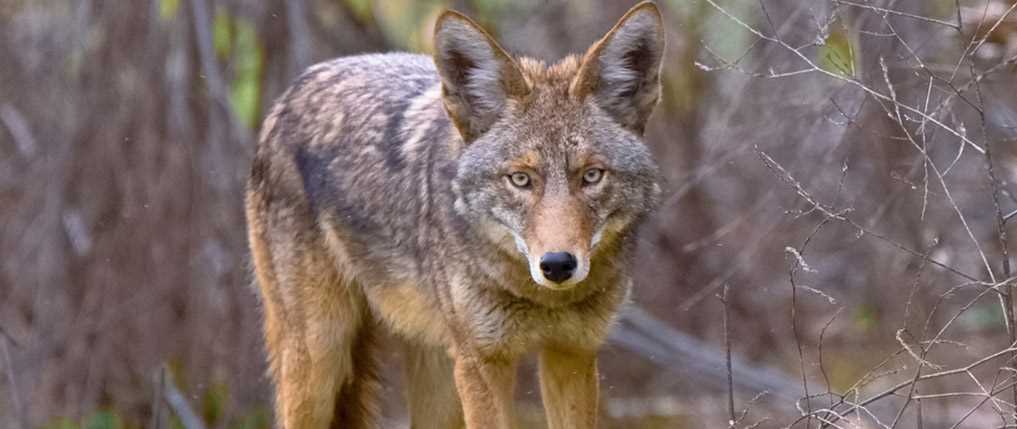
Michigan, with its vast wooded landscapes and diverse wildlife, provides ample opportunities for outdoor enthusiasts to engage in various hunting activities. One such activity is coyote hunting, which has gained popularity among hunters in recent years. The cunning and elusive nature of these canines makes them a challenging and exciting target for both seasoned hunters and novices alike.
When it comes to coyote hunting in Michigan, knowing the regulations is crucial. The Michigan Department of Natural Resources (MDNR) has set specific guidelines to ensure the sustainability and conservation of the coyote population. Hunters must possess a valid hunting license and follow specific rules regarding baiting, trapping, and predator control. It is essential to stay informed about the current regulations to avoid any legal issues during your hunting expedition.
One important aspect of coyote hunting is selecting the best locations. Michigan offers a range of habitats suitable for coyotes, including forests, agricultural fields, and wetlands. Knowing the characteristics of each area and understanding coyote behavior can significantly increase your chances of a successful hunt. Whether you prefer hunting during the day or under the cover of darkness, Michigan provides a variety of locations to cater to your hunting style.
Coyote Hunting in Michigan
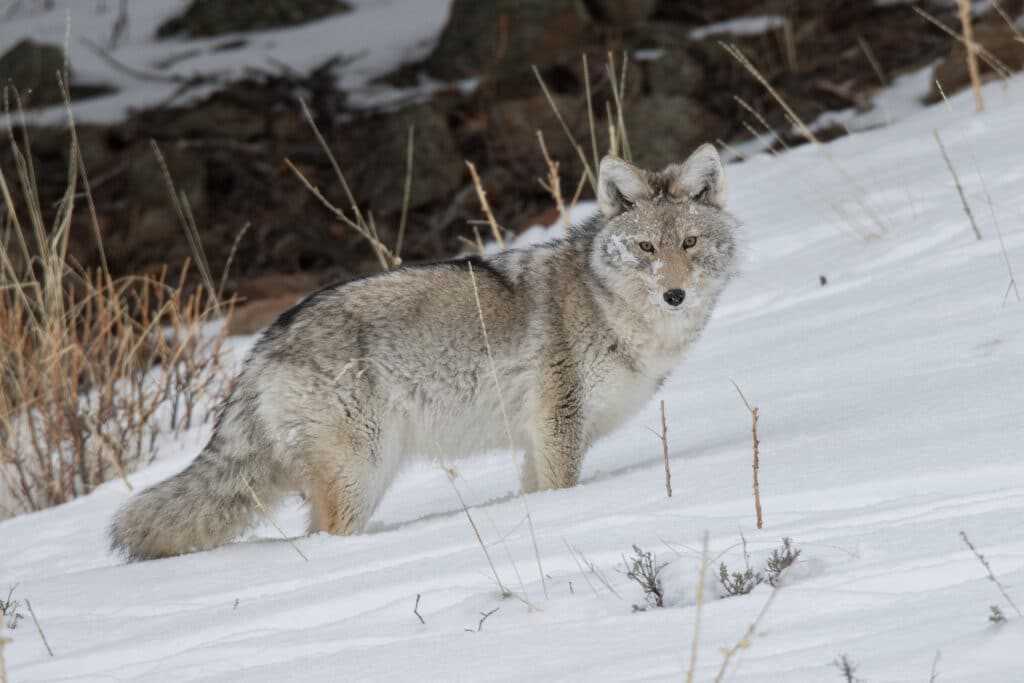
If you are an avid predator hunter or simply interested in wildlife, Michigan offers excellent opportunities for coyote hunting. Coyotes are a common and adaptable predator found throughout the state, making them an exciting target for hunters.
Before venturing into the field, it is important to familiarize yourself with the regulations and guidelines set forth by the Michigan Department of Natural Resources. These regulations are designed to ensure both the safety of hunters and the sustainable management of the coyote population.
- Obtain the necessary licenses and permits required for coyote hunting in Michigan. This includes a small game license, as well as a fur harvester license if you plan on trapping coyotes.
- Practice responsible hunting techniques and follow the guidelines outlined by the Michigan Department of Natural Resources. This includes respecting property boundaries, obtaining written permission from landowners, and adhering to any local ordinances or restrictions.
- Choose suitable hunting gear and equipment for coyote hunting. This may include firearms, archery equipment, or trapping tools, depending on your preferred method of hunting.
- Scout potential hunting locations in Michigan that are known for high coyote populations. Areas with abundant food sources, such as agricultural fields or areas with a large rodent population, are often prime locations for coyotes.
- Set up appropriate hunting strategies based on time of day and season. Coyotes are most active during dawn and dusk, so plan your hunts accordingly.
- Consider using predator calls, decoys, or other attractants to increase your chances of success. Coyotes are curious creatures and can be lured in by the sounds and sights of potential prey.
Coyote hunting in Michigan can be not only a thrilling adventure, but also a valuable contribution to the management of the state’s wildlife. By following regulations, practicing responsible hunting techniques, and selecting suitable gear, you can enjoy a successful and ethical coyote hunting experience.
Tips for a Successful Hunt

When it comes to coyote hunting, there are several important tips to keep in mind to increase your chances of a successful hunt:
- Choose the right bait: Selecting the proper bait is crucial when hunting coyotes. Opt for scents and lures specifically designed for attracting these cunning canines.
- Study their behavior: Understanding the behavior of coyotes can greatly improve your hunting success. Learn their habits, preferred habitats, and hunting patterns to better anticipate their movements.
- Patience is key: Hunting coyotes requires patience. These intelligent predators can be elusive, so be prepared to spend extended periods of time in your hunting location.
- Set effective traps: Trapping can be an effective method for hunting coyotes. Use efficient traps that are legal and humane to capture these wildlife predators.
- Practice calling techniques: Mastering the art of coyote calling can enhance your hunting results. Practice different calling techniques to mimic the sounds of distress or prey and draw coyotes closer to your location.
- Choose the right hunting location: Research and locate areas known for coyote activity. Focus on regions with suitable habitats and abundant prey populations to maximize your chances of a successful hunt.
- Stay concealed and still: Coyotes have sharp senses, so it’s important to remain concealed and motionless during the hunt. Use proper camouflage and avoid unnecessary movements that could alert these keen predators.
- Be prepared for weather conditions: Dress appropriately for the weather conditions to ensure a comfortable and successful hunting experience. Layer clothing and bring necessary gear for rain, snow, or extreme temperatures.
- Stay informed about regulations: Familiarize yourself with local hunting regulations and obtain any necessary permits or licenses. Adhere to ethical hunting practices and respect wildlife conservation laws.
- Always prioritize safety: Safety should be a top priority during any hunting activity. Practice responsible firearm handling, use appropriate hunting gear, and notify others about your hunting plans.
By following these tips, you can increase your chances of a successful coyote hunt and enjoy the thrill of pursuing these elusive predators.
Choose the Right Weapon

When it comes to coyote hunting in Michigan, choosing the right weapon is crucial. Whether you prefer firearms or archery equipment, selecting the appropriate weapon can greatly affect your success in hunting these elusive predators.
If you opt for firearms, shotguns and rifles are common choices. Shotguns loaded with buckshot or slugs are effective at close range, while rifles provide better accuracy and longer shooting distances. Make sure to follow Michigan’s hunting regulations and obtain the necessary permits for hunting coyotes with firearms.
On the other hand, if you’re inclined towards archery equipment, bows and crossbows can also be used for hunting coyotes. This method requires skill and precision, as coyotes are wary and quick-moving animals. Using bait or calling techniques can increase your chances of a successful hunt.
Trapping is another method to consider, especially if you want to target multiple coyotes in an area. Michigan’s predator hunting regulations allow for trapping, but make sure to familiarize yourself with the specific guidelines and obtain the necessary trapping licenses.
Before selecting your weapon, it’s important to understand the local laws and regulations regarding coyote hunting. The Michigan Department of Natural Resources provides detailed information on seasons, bag limits, and methods allowed for coyote hunting. It’s essential to abide by these regulations to ensure the safety of both the hunter and the wildlife.
Choose your weapon wisely, consider the hunting methods you are comfortable with, and always prioritize safety and respect for the environment when engaging in coyote hunting in Michigan.
Practice Calling Techniques

Calling is an essential skill for trapping coyotes and increasing your chances of a successful hunt. By mimicking the sounds of distressed prey or other coyotes, you can lure these cunning predators out into the open. However, it’s important to remember that coyotes are intelligent and cautious animals, so mastering the art of calling takes time and practice.
There are various types of calls you can use, including electronic calls and mouth calls. Electronic calls are easier to use and allow you to produce a wide range of realistic sounds, while mouth calls require more skill and practice. Whichever option you choose, it’s important to become familiar with the different types of calls and when to use them.
When practicing your calling techniques, start by learning the basic calls, such as distress calls of rodents or birds, which are commonly used to attract coyotes. Once you’ve mastered these calls, you can move on to more advanced ones to simulate a coyote fight or a pack howling. Remember to vary the volume, duration, and intensity of your calls to make them sound more natural. Additionally, incorporating pauses between calls can create a sense of anticipation for the approaching coyote.
Another effective technique is to combine your calling with the use of bait. Placing bait or a decoy near your calling location can entice coyotes to come closer, increasing your chances of a successful hunt. However, it’s important to check local regulations regarding the use of bait, as some areas may have restrictions on this practice.
| Calling Technique Tips |
|---|
| Practice regularly to improve your calling skills |
| Experiment with different calls and sounds |
| Vary the volume, duration, and intensity of your calls |
| Incorporate pauses between calls to create anticipation |
| Combine calling with the use of bait or decoys |
| Check local regulations regarding the use of bait |
By practicing your calling techniques and understanding the behavior of these cunning canines, you can greatly improve your chances of a successful coyote hunt in Michigan. Remember to always prioritize safety and abide by the hunting regulations in your area. Good luck!
Use Appropriate Camouflage
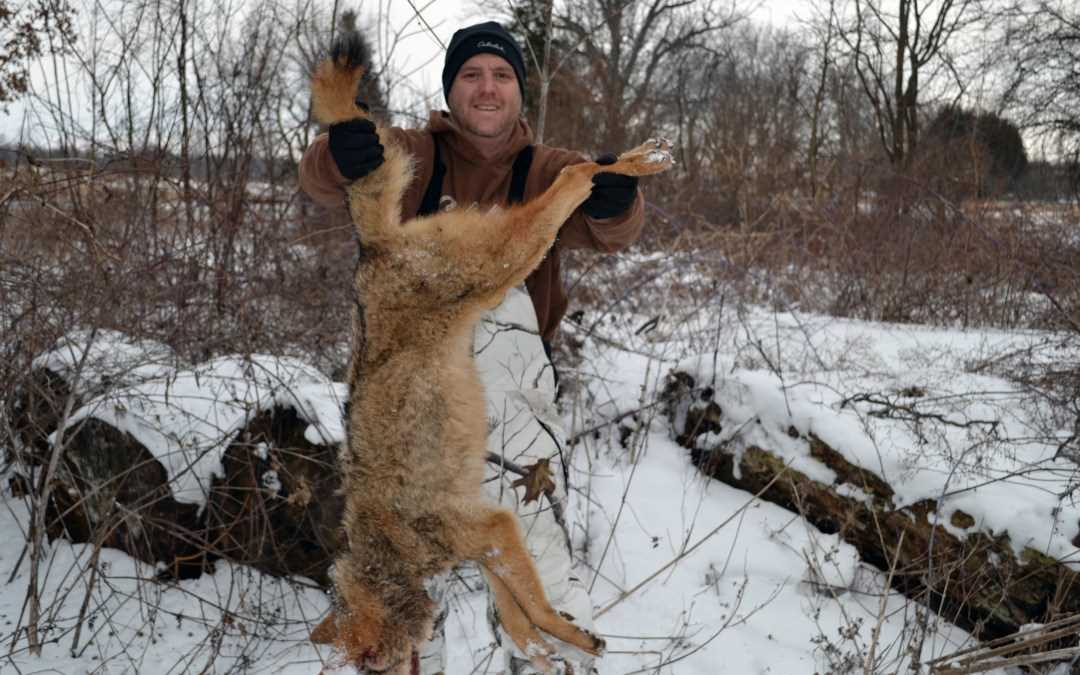
When it comes to coyote hunting in Michigan, one of the most important factors for success is using appropriate camouflage. Canines like coyotes have keen senses and can easily detect any unnatural movement or color. Therefore, it is essential to blend in with your surroundings.
Invest in high-quality camouflage clothing and gear that matches the wildlife in Michigan. This will help you hide effectively and make it difficult for the predator to spot you. Choose patterns that mimic the natural environment, such as woodland or grassland designs, and avoid bright colors that stand out.
Additionally, consider using natural cover like bushes or trees to further conceal yourself during the hunt. Position yourself downwind from your target, as coyotes have a strong sense of smell and can pick up on foreign scents.
Remember, in Michigan, trapping and bait are not allowed for coyote hunting, so relying on your camouflage skills and tracking abilities is crucial. By using appropriate camouflage, you increase your chances of a successful coyote hunt and contribute to wildlife management in Michigan.
Regulations to Follow

When it comes to coyote hunting in Michigan, there are certain regulations that must be followed to ensure the safety of both hunters and wildlife. These regulations are in place to protect the canine predator and other wildlife while still allowing for responsible hunting and trapping practices.
First and foremost, it is important to obtain the necessary licenses and permits before engaging in any coyote hunting or trapping activities. This includes having a valid Michigan hunting license and a furbearer’s license. These licenses can be obtained from the Michigan Department of Natural Resources website or through authorized retailers.
As coyotes are classified as a furbearer in Michigan, there are specific rules and regulations regarding the use of bait for hunting. Baiting is allowed for coyote hunting, but it is important to remember that it is illegal to use any wildlife parts as bait. This includes using the remains of other animals or any parts that could be considered as bait.
In addition to baiting regulations, there are also rules regarding the methods used to hunt coyotes. Michigan allows for hunting coyotes with firearms, archery equipment, or by trapping. However, it is important to follow all safety guidelines, including using legal firearms, following shooting hours, and maintaining a safe distance from roads and occupied buildings.
When it comes to trapping, it is important to comply with the regulations outlined by the Michigan Department of Natural Resources. This includes using legal traps, checking them regularly, and following specific guidelines for setting and placing traps. Trappers should also be aware of any additional local regulations that may be in place.
Lastly, it is crucial to report any harvested or trapped coyotes as required by law. This information is important for wildlife management purposes and helps ensure the accurate tracking of predator populations. Michigan requires hunters and trappers to report coyote harvest within 48 hours by phone or online through the DNR’s Harvest Reporting System.
By following these regulations, hunters and trappers can enjoy a responsible and legal coyote hunting experience in Michigan while also supporting the conservation of our state’s wildlife populations.
Obtain the Required Licenses
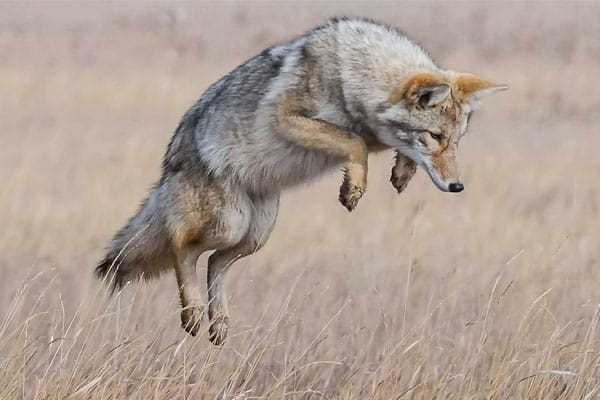
Before you embark on your coyote hunting adventure in Michigan, it’s essential to ensure that you have all the necessary licenses. Hunting coyotes in the state requires a valid hunting license, which can be obtained from the Michigan Department of Natural Resources (DNR). This license grants you the legal authority to hunt not only coyotes but other wildlife as well.
In addition to the general hunting license, you may also need a predator hunting license specifically for hunting coyotes. This license helps regulate and manage coyote populations, as they are considered a predator and may pose a threat to other wildlife.
It’s essential to familiarize yourself with the specific regulations surrounding coyote hunting in Michigan to ensure that you comply with the law. For example, the use of bait may be permitted in some instances, while prohibited in others. Some areas may have specific hunting seasons or zones where hunting is allowed or restricted.
Obtaining the required licenses not only ensures that you are legally allowed to hunt coyotes but also helps support wildlife conservation efforts in Michigan. By obtaining the necessary licenses, you contribute to the funding of various conservation programs that protect the state’s natural resources.
Remember that coyotes are considered a game species in Michigan, and hunting them is regulated by the DNR. It’s important to hunt responsibly and ethically, ensuring that you adhere to all hunting laws and regulations. Always respect the wildlife and the ecosystems in which they live.
So, before you head out on your next coyote hunting trip in Michigan, make sure to obtain the required licenses. This will not only give you the legal authorization to hunt these fascinating canines but also demonstrate your commitment to supporting wildlife conservation in the state.
Adhere to Hunting Season and Time Restrictions
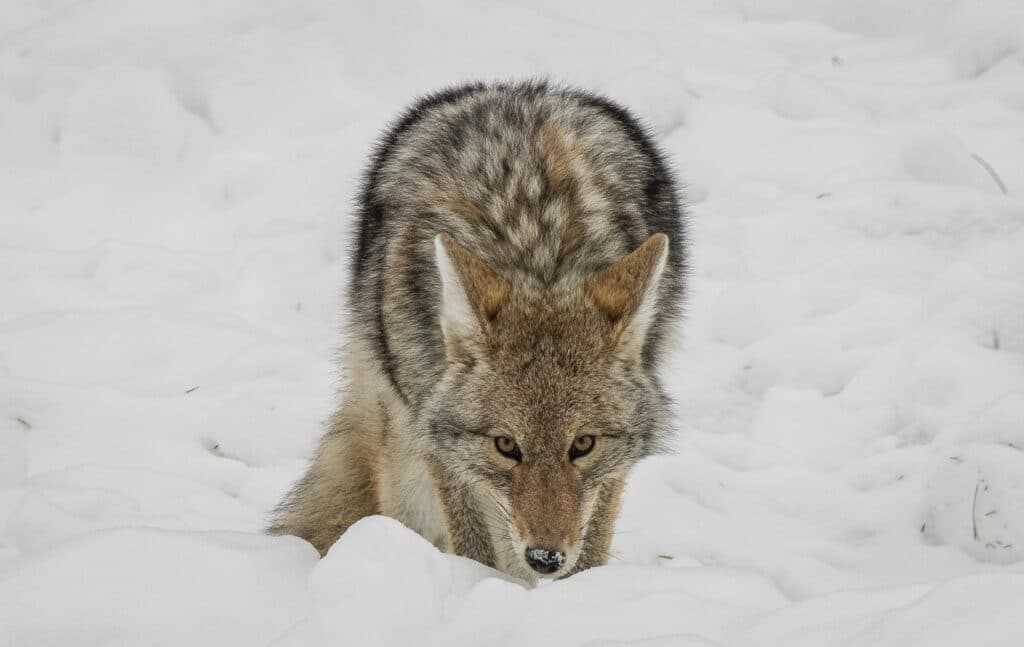
When it comes to coyote hunting in Michigan, it is essential to adhere to the hunting season and time restrictions set by the Michigan Department of Natural Resources (DNR). These regulations are in place to protect the canine wildlife population and ensure responsible hunting practices.
Michigan has specific hunting seasons for different types of wildlife, including predators like coyotes. It is crucial to familiarize yourself with the hunting season dates, as they can vary from year to year. The DNR regularly updates the hunting seasons to maintain a balanced ecosystem and manage the predator population effectively.
In addition to hunting season restrictions, it is vital to follow the time restrictions for coyote hunting. Often, coyote hunting is only allowed during designated hours, typically from one hour before sunrise to one hour after sunset. It is important to check the specific regulations for the hunting area you plan to explore, as the time restrictions may vary.
By adhering to hunting season and time restrictions, you contribute to the conservation efforts of Michigan’s wildlife and help maintain a sustainable predator population. The regulations enable the trapping, hunting, and baiting of coyotes to be conducted responsibly, minimizing the impact on other wildlife and ensuring a fair and ethical hunt.
Remember, always stay up to date on the Michigan DNR regulations, as they are subject to change. Maintaining respect for the hunting season and time restrictions ensures a safe and enjoyable coyote hunting experience in Michigan.
Abide by Bag Limits and Reporting Requirements

When participating in coyote hunting in Michigan, it is important to be aware of the bag limits and reporting requirements set by the state. Bag limits refer to the number of coyotes that can be legally harvested during a single hunting season. These limits are put in place to ensure the conservation of the canine population while controlling their numbers.
In Michigan, the bag limit for coyote hunting varies depending on the type of hunting method used. For general hunting, the bag limit is set at an unlimited number, meaning there is no specific limit on the number of coyotes that can be harvested. However, for trapping and cable restraints, there is a limit of five coyotes per person per season.
Reporting requirements are also an important aspect of coyote hunting in Michigan. Hunters are required to report their harvested coyotes within 48 hours of the kill. This can be done online or by calling the Department of Natural Resources. The reporting of harvested coyotes helps authorities monitor the predator population and gather data on the wildlife population in the state.
By abiding by bag limits and reporting requirements, hunters can contribute to the effective management of coyotes in Michigan. This ensures the preservation of the ecosystem and the balance of the predator and prey populations.
Best Locations for Coyote Hunting

Michigan offers a variety of great locations for coyote hunting due to its diverse landscape and abundant wildlife. Whether you prefer hunting through canyons, dense forests, open fields, or near water sources, Michigan has something for every hunter.
Here are some of the best locations to consider for your next coyote hunting adventure:
- Shiawassee National Wildlife Refuge: This refuge is located in Saginaw County and covers over 9,000 acres of wetlands, forests, and grasslands. It attracts a large population of coyotes, making it an ideal spot for hunting these elusive predators.
- Manistee National Forest: With its vast expanse of forests and diverse wildlife, the Manistee National Forest in northern Michigan offers excellent opportunities for coyote hunting. Its remote location also provides a peaceful and immersive hunting experience.
- Sleepy Hollow State Park: Situated in Clinton County, Sleepy Hollow State Park offers a mix of wooded areas and open fields, providing a variety of hunting environments. Coyotes can often be found near the edges of the park, making it a productive hunting location.
- Waterloo Recreation Area: Located in Jackson and Washtenaw counties, this sprawling recreation area is known for its diverse wildlife and abundant hunting opportunities. The mix of wetlands, woods, and fields attracts a healthy population of coyotes.
- Huron National Forest: With over 400,000 acres of forests, rivers, and lakes, Huron National Forest offers a wilderness hunting experience. The forest’s remote and rugged terrain provides ample opportunities for tracking and trapping coyotes.
When selecting a location for coyote hunting, it’s important to consider areas with a high population of coyotes and suitable habitats. Always follow local regulations and obtain the proper licenses and permits before embarking on your coyote hunting adventure in Michigan.
National Forests and Wildlife Areas
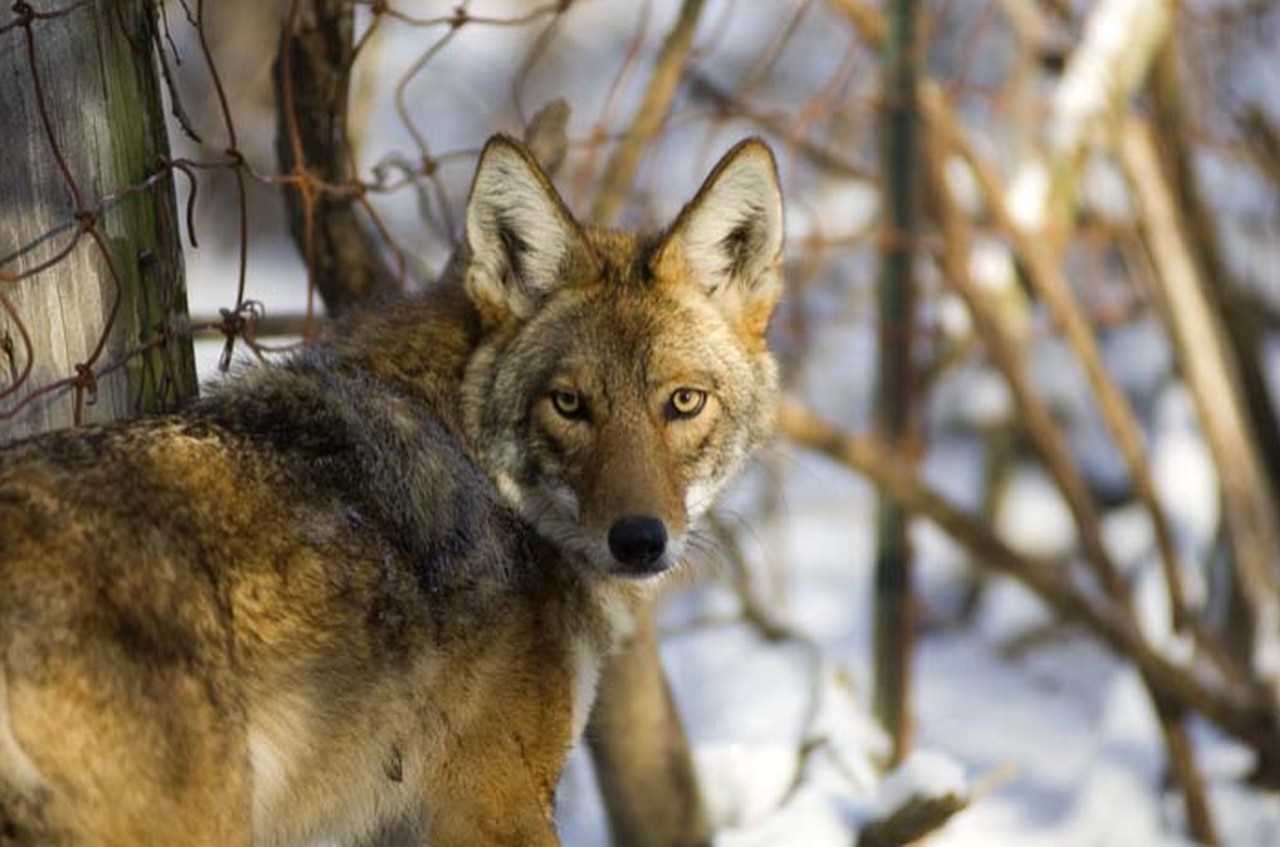
Michigan is home to several national forests and wildlife areas that provide excellent opportunities for coyote hunting. These areas are managed by the Michigan Department of Natural Resources and offer a variety of habitats and landscapes for baiting, trapping, and hunting coyotes.
One popular national forest for coyote hunting is the Huron-Manistee National Forests. Spanning over 900,000 acres, these forests are located in the northern Lower Peninsula of Michigan. The vast expanses of forests, wetlands, and meadows provide ideal habitats for coyotes, making them a prime location for predator hunting.
The Ottawa National Forest is another great option for coyote hunting. Located in the western Upper Peninsula of Michigan, this forest covers over 900,000 acres of land. The diverse landscape, including dense forests and open fields, is home to a thriving coyote population. Hunters can set up bait stations or use predator calls to attract coyotes in this area.
In addition to national forests, Michigan also has several wildlife areas that offer excellent coyote hunting opportunities. The Shiawassee River State Game Area is one such area. Covering over 2,500 acres, this wildlife area is located in Saginaw County. It features a mix of wetlands, forests, and grasslands, providing ample cover for coyotes. Hunters can choose to use bait or employ trapping techniques in this area to increase their chances of a successful hunt.
The Allegan State Game Area is another popular destination for coyote hunting. Located in Allegan County, this wildlife area spans over 50,000 acres and offers a diverse range of habitats. Hunters can set up bait stations or use calling techniques to attract coyotes in this area.
When hunting in national forests and wildlife areas, it is important to follow all regulations set forth by the Michigan Department of Natural Resources. These regulations may include specific guidelines on baiting, trapping, and hunting coyotes. It is also crucial to practice ethical hunting practices and respect the wildlife and natural resources of these protected areas.
Whether you choose to hunt in a national forest or a wildlife area, Michigan offers a variety of options for coyote hunting. With the proper permits and adherence to regulations, hunters can enjoy a successful and thrilling hunt in these beautiful and abundant landscapes.

A skilled hunter, dedicated conservationist, and advocate for ethical practices. Respected in the hunting community, he balances human activity with environmental preservation.
